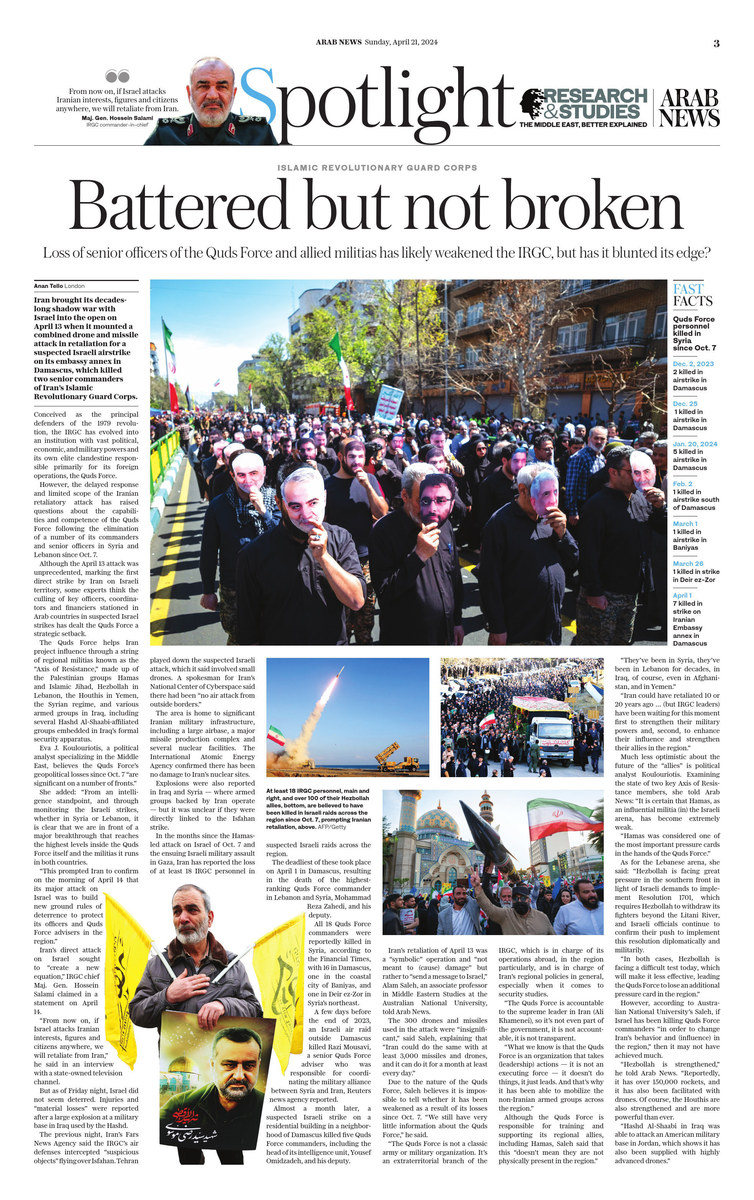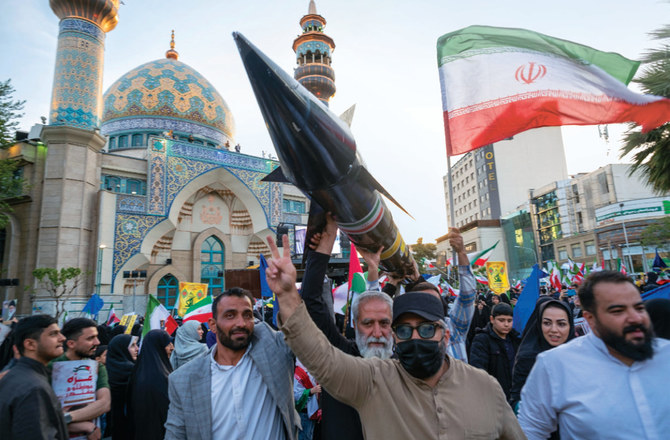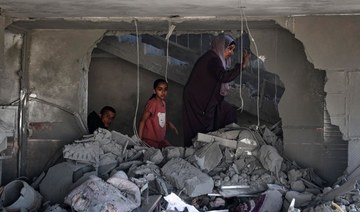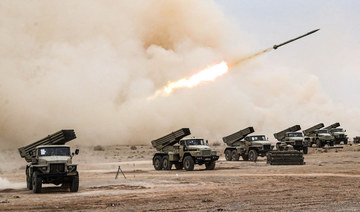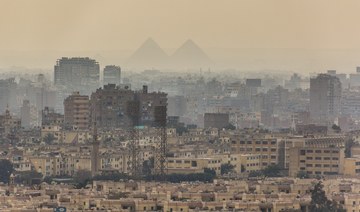LONDON: Iran brought its decades-long shadow war with Israel into the open on April 13 when it mounted a combined drone and missile attack in retaliation for a suspected Israeli airstrike on its embassy annex in Damascus, which killed two senior commanders of Iran’s Islamic Revolutionary Guard Corps.
Conceived as the principal defenders of the 1979 revolution, the IRGC has evolved into an institution with vast political, economic, and military powers and its own elite clandestine responsible primarily for its foreign operations, the Quds Force.
However, the delayed response and limited scope of the Iranian retaliatory attack has raised questions about the capabilities and competence of the Quds Force following the elimination of a number of its commanders and senior officers in Syria and Lebanon since Oct. 7.

Mourners attend the funeral in Tehran on January 22, 2023, of three Iranian Revolutionary Guard Corps members killed in Damascus in a strike blamed on Israel on January 20. (AFP)
Although the April 13 attack was unprecedented, marking the first direct strike by Iran on Israeli territory, some experts think the culling of key officers, coordinators and financiers stationed in Arab countries in suspected Israel strikes has dealt the Quds Force a strategic setback.
The Quds Force helps Iran project influence through a string of regional militias known as the “Axis of Resistance,” made up of the Palestinian groups Hamas and Islamic Jihad, Hezbollah in Lebanon, the Houthis in Yemen, the Syrian regime, and various armed groups in Iraq, including several Hashd Al-Shaabi-affiliated groups embedded in Iraq’s formal security apparatus.
Eva J. Koulouriotis, a political analyst specializing in the Middle East, believes the Quds Force’s geopolitical setbacks since Oct. 7 “are significant on a number of fronts.”
She added: “From an intelligence standpoint, and through monitoring the Israeli strikes, whether in Syria or Lebanon, it is clear that we are in front of a major breakthrough that reaches the highest levels inside the Quds Force itself and the militias it runs in both countries.
FASTFACTS
Quds Force personnel killed in Syria since Oct. 7, 2023
• Dec. 2, 2023: 2 killed in airstrike in Damascus.
• Dec. 25: 1 killed in airstrike in Damascus.
• Jan. 20, 2024: 5 killed in airstrike in Damascus.
• Feb. 2: 1 killed in airstrike south of Damascus.
• March 1: 1 killed in airstrike in Baniyas.
• March 26: 1 killed in strike in Deir ez-Zor.
• April 1: 7 killed in strike on Iranian embassy annex in Damascus.
“This prompted Iran to confirm on the morning of April 14 that its major attack on Israel was to build new ground rules of deterrence to protect its officers and Quds Force advisers in the region.”
Iran’s direct attack on Israel sought to “create a new equation,” IRGC chief Maj. Gen. Hossein Salami claimed in a statement on April 14.
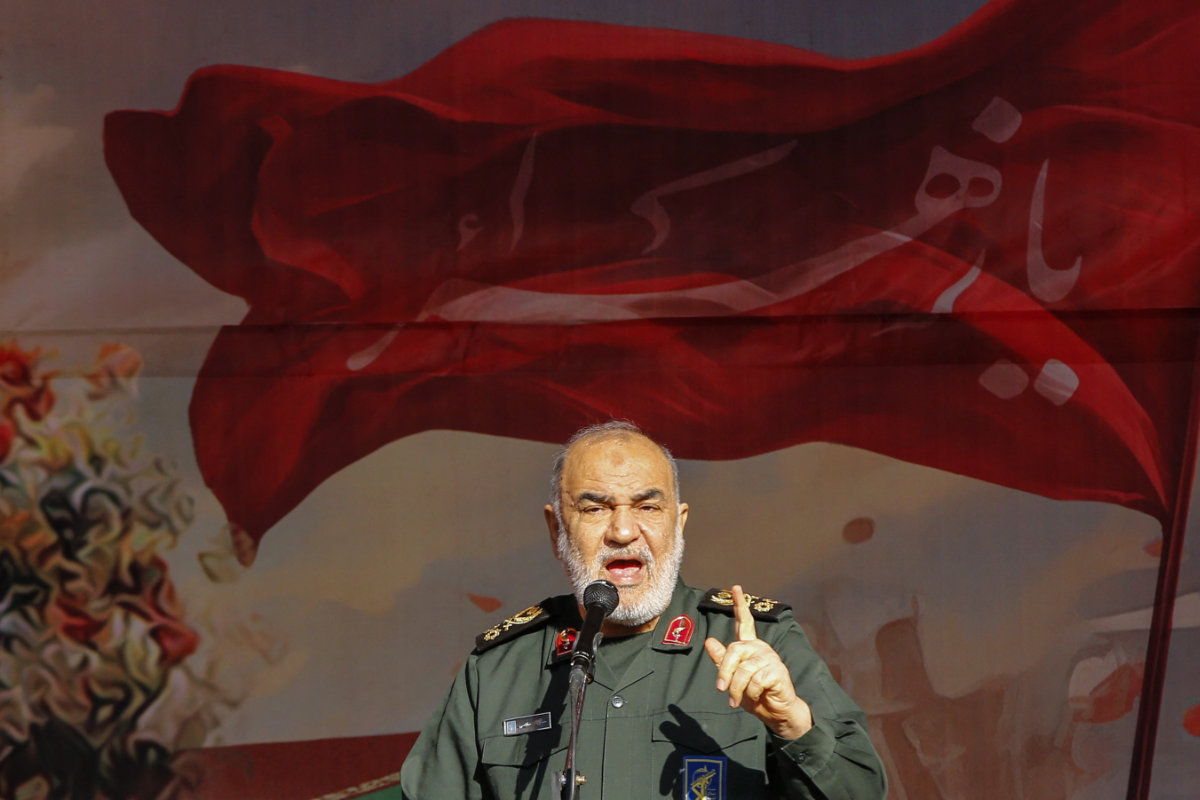
Maj. Gen. Hossein Salami, commander of Iran's Islamic Revolutionary Guard Corps. (AFP/File)
“From now on, if Israel attacks Iranian interests, figures and citizens anywhere, we will retaliate from Iran,” he said in an interview with a state-owned television channel.
But as of Friday night, Israel did not seem deterred. Injuries and “material losses” were reported after a large explosion at a military base in Iraq used by the Hashd and home to its chief of staff.
The blast, at the Kalsu facility in Babylon, killed one Hashd fighter and wounded six more, according to nearby hospital sources. Factions within the Hashd took part in rocket and drone attacks on US forces in Iraq in the early months of Israel’s Gaza offensive.
The previous night, Iran’s Fars News Agency said the IRGC’s air defenses intercepted “suspicious objects” flying over Isfahan. Tehran played down the suspected Israeli attack on an air base, which it said involved small drones. Hossein Dalirian, a spokesman for Iran’s National Centre of Cyberspace, said there had been “no air attack from outside borders.”
The area is home to significant Iranian military infrastructure, including a large airbase, a major missile production complex and several nuclear facilities. The International Atomic Energy Agency confirmed there has been no damage to Iran’s nuclear sites.
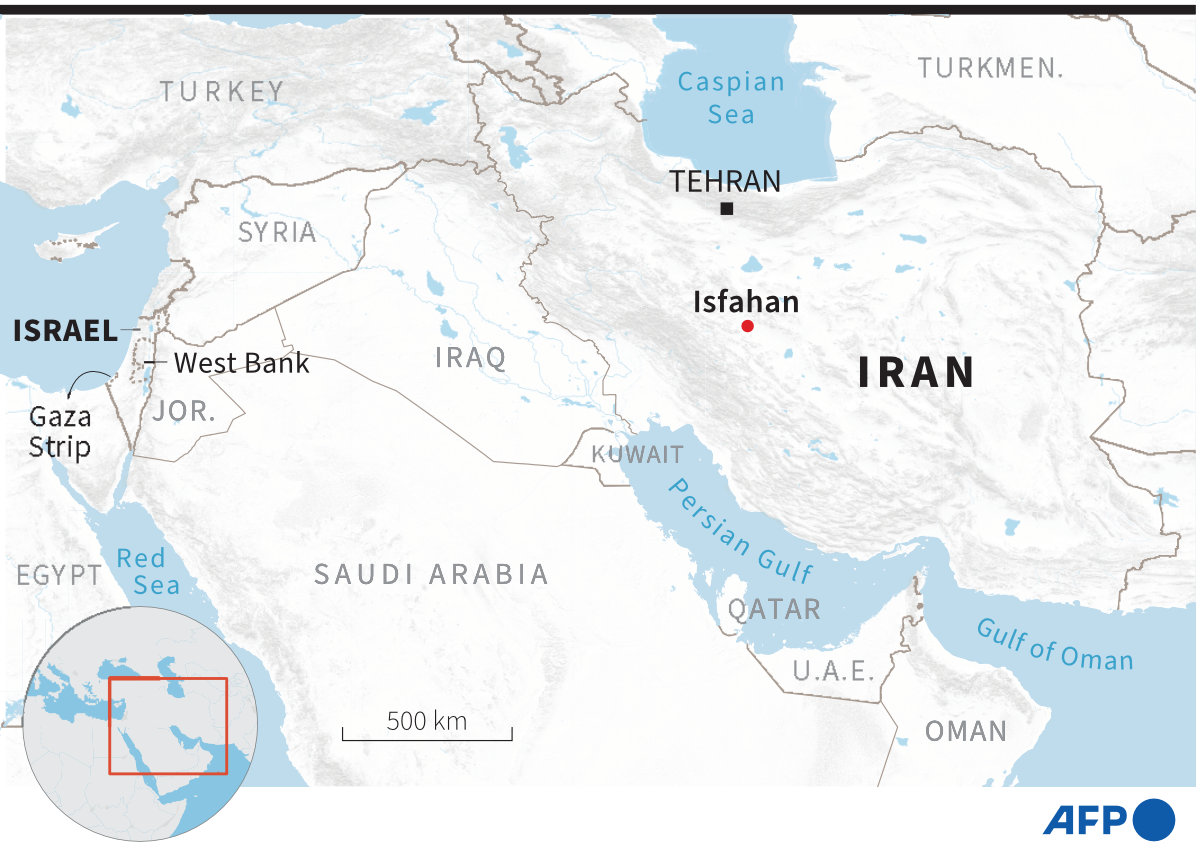
Map showing the location of Isfahan in Iran, the target of a supposed Israeli drone strike last week. (APF/File)
Explosions were also reported in Iraq and Syria — where armed groups backed by Iran operate — but it was unclear if they were directly linked to the Isfahan strike.
In the months since the Hamas-led attack on Israel of Oct. 7 and the ensuing Israeli military assault in Gaza, Iran has reported the loss of at least 18 IRGC personnel in suspected Israeli raids across the region.
The deadliest of these took place on April 1 in Damascus, resulting in the death of the highest-ranking Quds Force commander in Lebanon and Syria, Mohammad Reza Zahedi, and his deputy.
All 18 Quds Force commanders were reportedly killed in Syria, according to the Financial Times, with 16 in Damascus, one in the coastal city of Baniyas, and one in Deir ez-Zor in Syria’s northeast.
A few days before the end of 2023, an Israeli air raid outside Damascus killed Razi Mousavi, a senior Quds Force adviser who was responsible for coordinating the military alliance between Syria and Iran, Reuters news agency reported.

In this photo taken on December 28, 2023, mourners attend the funeral of Razi Mousavi, a senior commander of Iran's Quds Force, who was killed on December 25 in an Israeli strike in Syria. (AFP/File)
Almost a month later, a suspected Israeli strike on a residential building in the Mezzeh Western Villas neighborhood of Damascus killed five Quds Force commanders, including the head of the force’s intelligence unit, Yousef Omidzadeh, and his deputy.
Iran’s retaliation of April 13 was a “symbolic” operation and “not meant to (cause) damage” but rather to “send a message to Israel,” Alam Saleh, an associate professor in Middle Eastern Studies at the Australian National University, told Arab News.
The 300 drones and missiles used in the attack were “insignificant,” said Saleh, explaining that “Iran could do the same with at least 3,000 missiles and drones, and it can do it for a month at least every day.”
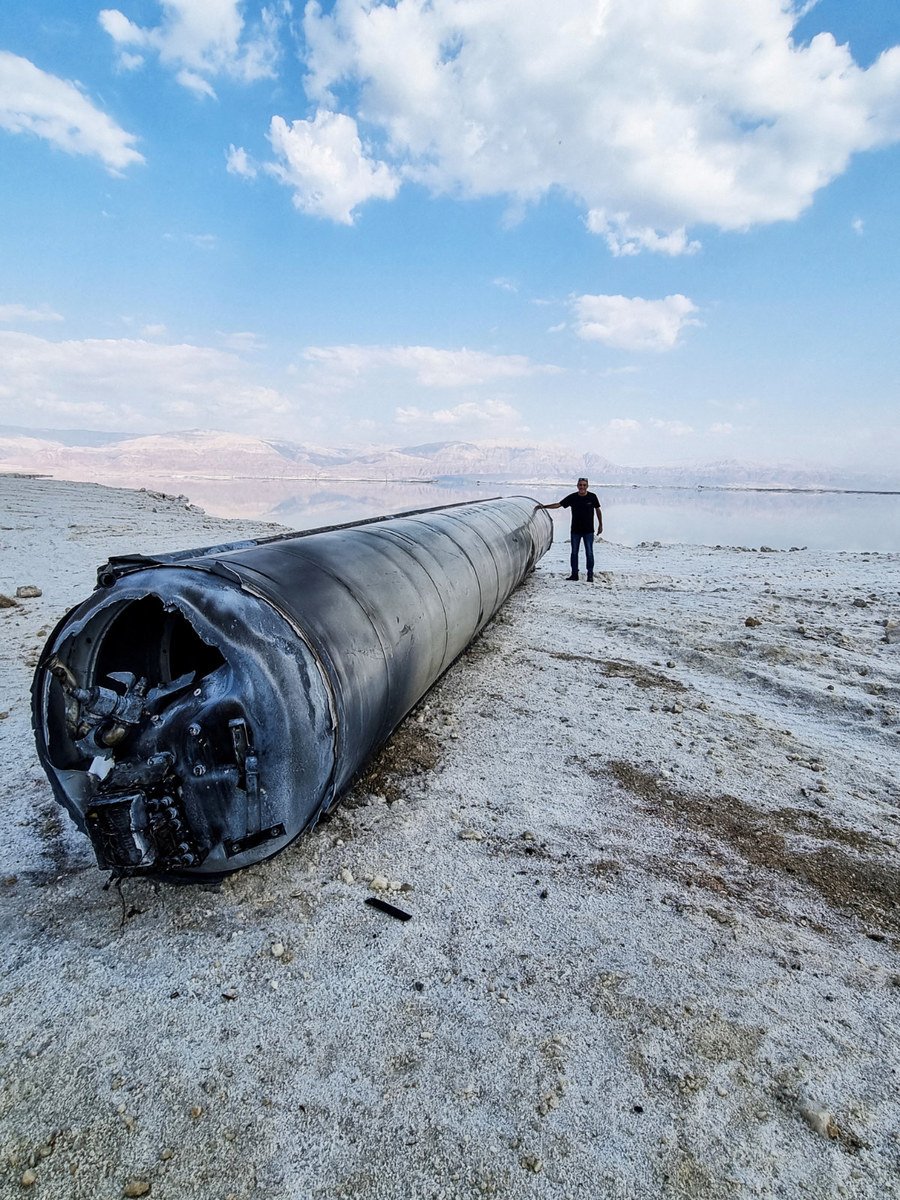
The remains of a ballistic missile lies on the shore of the Dead Sea after it was shot down from the sky on April 14, 2024. It was one of the missiles launched by Iran during a missiles and drones attack against Israel. (Reuters)
Due to the nature of the Quds Force, Saleh believes it is impossible to tell whether it has been weakened as a result of its losses since Oct. 7. “We still have very little information about the Quds Force,” he said.
“The Quds Force is not a classic army or military organization. It’s an extraterritorial branch of the IRGC, which is in charge of its operations abroad, in the region particularly, and is in charge of Iran’s regional policies in general, especially when it comes to security studies.
“The Quds Force is accountable to the supreme leader in Iran (Ali Khamenei), so it’s not even part of the government, it is not accountable, it is not transparent.
“What we know is that the Quds Force is an organization that takes (leadership) actions — it is not an executing force — it doesn’t do things, it just leads. And that’s why it has been able to mobilize the non-Iranian armed groups across the region.”
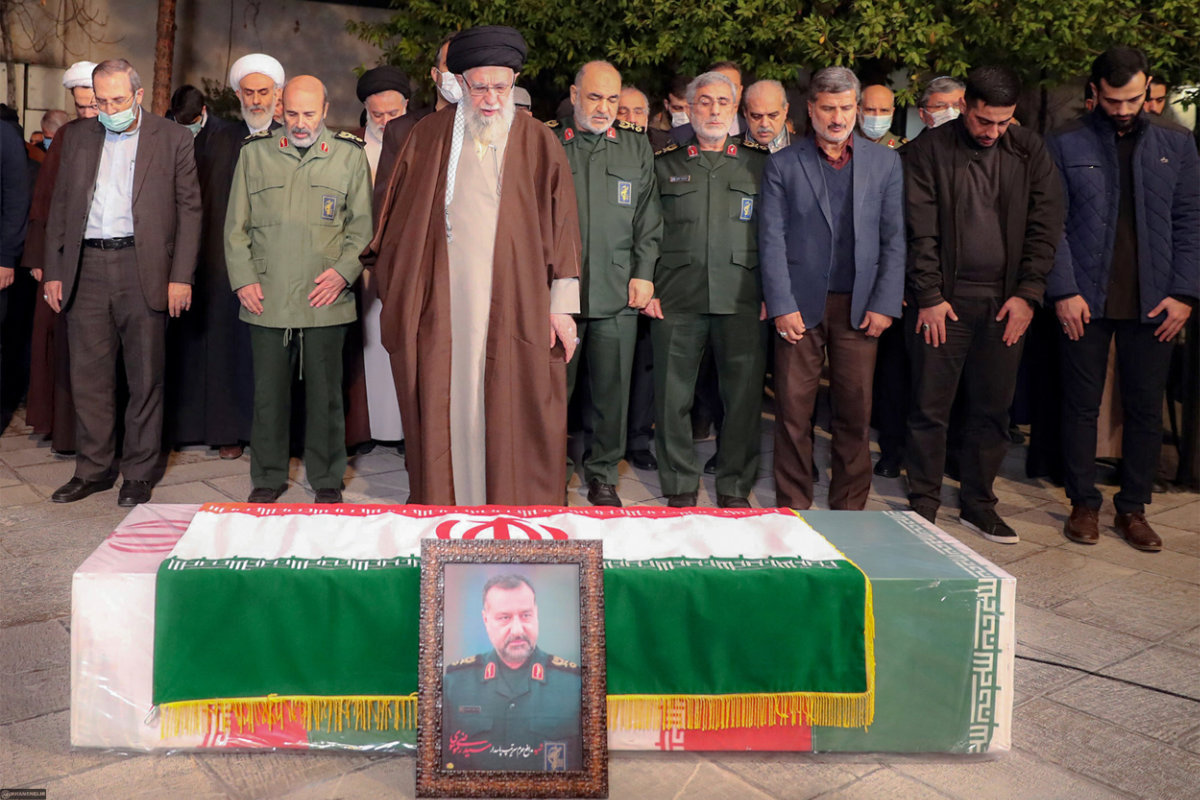
Iran's Supreme Leader Ayatollah Ali Khamenei on December 28, 2023 leads a prayer next to the coffin of of Razi Moussavi, a senior commander in Iran's Quds Force who was killed on December 25 in an Israeli strike in Syria. (KHAMENEI.IR via AFP)
Although the Quds Force is responsible for training and supporting its regional allies, including Hamas, Saleh said that this “doesn’t mean they are not physically present in the region.”
“They’ve been in Syria, they’ve been in Lebanon for decades, in Iraq, of course, even in Afghanistan, and in Yemen.”
Saleh stressed that even the size of the Quds Force remains unknown, with reports estimating the ranks of the IRGC’s overseas arm at anywhere “between 5,000 and 40,000.”
“What we know is that they are too powerful,” he said.
“Iran could have retaliated 10 or 20 years ago … (but IRGC leaders) have been waiting for this moment first to strengthen their military powers and, second, to enhance their influence and strengthen their allies in the region.”
Considerably less optimistic about the future of the “allies” is political analyst Koulouriotis. Examining the state of two key Axis of Resistance members, she told Arab News: “It is certain that Hamas, as an influential militia (in) the Israeli arena, has become extremely weak.

“Hamas was considered one of the most important pressure cards in the hands of the Quds Force.”
As for the Lebanese arena, she said: “Hezbollah is facing great pressure in the southern front in light of Israeli demands to implement Resolution 1701, which requires Hezbollah to withdraw its fighters beyond the Litani River, and Israeli officials continue to confirm their push to implement this resolution diplomatically and militarily.
“In both cases, Hezbollah is facing a difficult test today, which will make it less effective, leading the Quds Force to lose an additional pressure card in the region.”
However, a report released last month by the Center for Strategic and International Studies, a Washington-based think tank, said that “although Hezbollah has lost over 100 fighters since Oct. 7, this level of casualties is manageable for a large organization with many skilled personnel.”
Hezbollah, a key component of the ,” is considered one of the world’s most heavily armed non-state groups, according to Reuters, and has demonstrated the scale of its arsenal since Oct. 7.
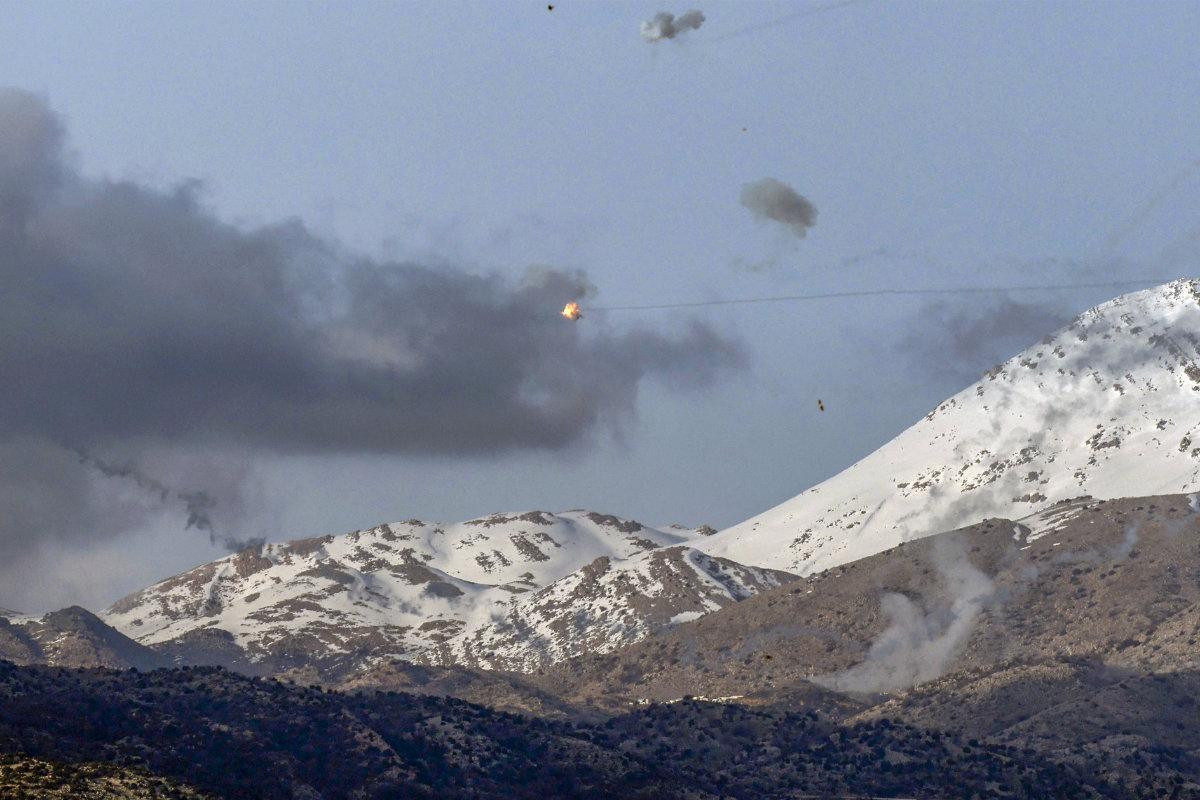
Israel's Iron Dome missile defense system intercepts rockets fired by Hezbollah fighters from south Lebanon over the Har Dove area on March 10, 2024, amid increasing cross-border tensions between the Iran-backed militia and Israel. (AFP)
The group is estimated to possess some 150,000 missiles and rockets, which, Hezbollah claims, can reach all areas of Israel.
According to Australian National University’s Saleh, if Israel has been killing Quds Force commanders “in order to change Iran’s behavior and (influence) in the region,” then it may not have achieved much.
“Hezbollah is strengthened,” he told Arab News. “Reportedly, it has over 150,000 rockets, and it has also been facilitated with drones. Of course, the Houthis are also strengthened and are more powerful than ever.
“Hashd Al-Shaabi in Iraq was able to attack an American military base in Jordan, which shows it has also been supplied with highly advanced drones.”
Since Oct. 7, Iran-backed militias have attacked US interests in Iraq and Syria more than 160 times, according to Pentagon figures. One attack on US forces in Jordan, carried out by Iraq’s Kataib Hezbollah, killed three Americans.
“If we look at (Israel’s) so-called success from Tehran’s point of view, these assassinations did not work,” said Saleh, referring to the killing of Quds Force commanders. Instead, “they had a negative impact on the region. It made Iran more aggressive and more determined to respond.”

Saleh believes that while the killings “look good in the media,” when it comes to the attack on the Iranian diplomatic premises in Damascus, “Israel has miscalculated.”
And although the suspected attacks “show that Israel is, in terms of intelligence, powerful,” said Saleh, “strategically, (they) didn’t change anything — none of these assassinations changed Iran’s behavior, nor did they reduce its power.”
The Israelis “thought they got away with other assassinations or with targeting Iran’s interests, so they thought they could get away with” the Damascus strike, he said.
Stressing that the US is the only power that can cause “real damage to Iran’s military,” Saleh said Israel, which “doesn’t have the technology or capabilities to invade Iran’s nuclear sites,” has failed to drag the US into a direct confrontation with Iran.
“Iran illustrated a good degree of rationality and responsibility in attacking Israel” by informing the regional powers and international powers about their intentions and resorting to a “very low-scale, symbolic” attack, he said.
However, “definitely, (the response) won’t be the same next time. Next time, it will be different. It will (involve) elements of surprise, strength, and regional proxies … to make sure Israel is deterred.”
